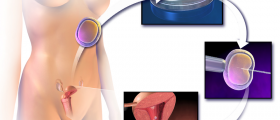
With the ovulation-inducing drug clomiphene plus sexual intercourse timed to match ovulation, about 6 per cent of couples get pregnant within a month. Clomiphene can only work if there is no scar tissue blocking the ovaries. With clomiphene plus artificial insemination, the figure is 10 per cent. Clomiphene induces ovulation, and artificial insemination helps the sperm bypass the cervix. With gonadotrophin replacement (hormones that affect not just the release of the egg but also the readiness of the uterus to receive it), about 17 per cent of couples get pregnant within the first month of treatment. And with IVF, anywhere from 30 to 50 per cent of couples get pregnant in just the first month. The US Centers for Disease Control reports that in 2005 there were 134,260 IVF procedures resulting in the birth of 52,041 babies. This unfortunately means that the majority of IVF procedures resulted in miscarriage.
When IVF is performed on women aged 20 to 24, over 75 per cent carry their child to term. When IVF is performed on women aged 40 to 44, over 75 per cent suffer miscarriage. At the very best IVF centers, doctors often tell women they will not offer the procedure. The OB-GYN will not expose patients to the expense and heartbreak of interrupted pregnancy. At the centers that are selective about the patients they will treat, however, women have the greatest possibility of bringing a child full term.

















Your thoughts on this
Loading...